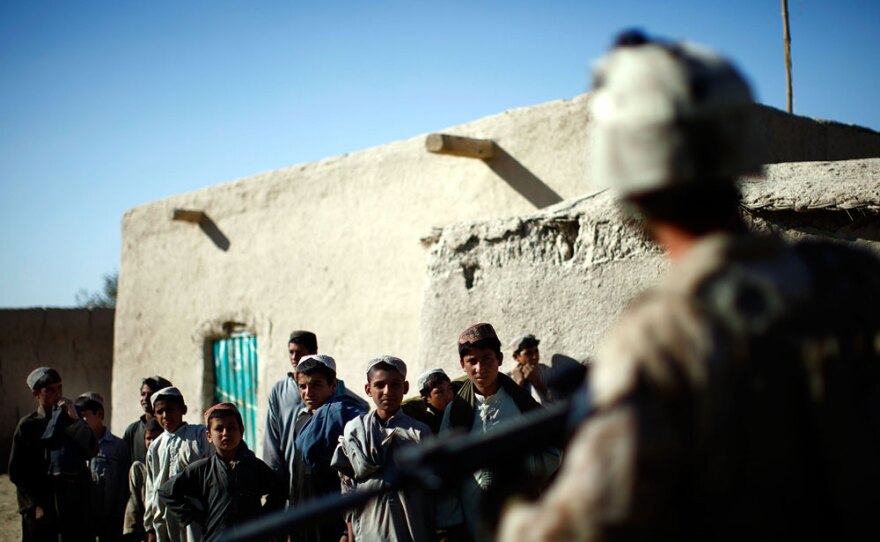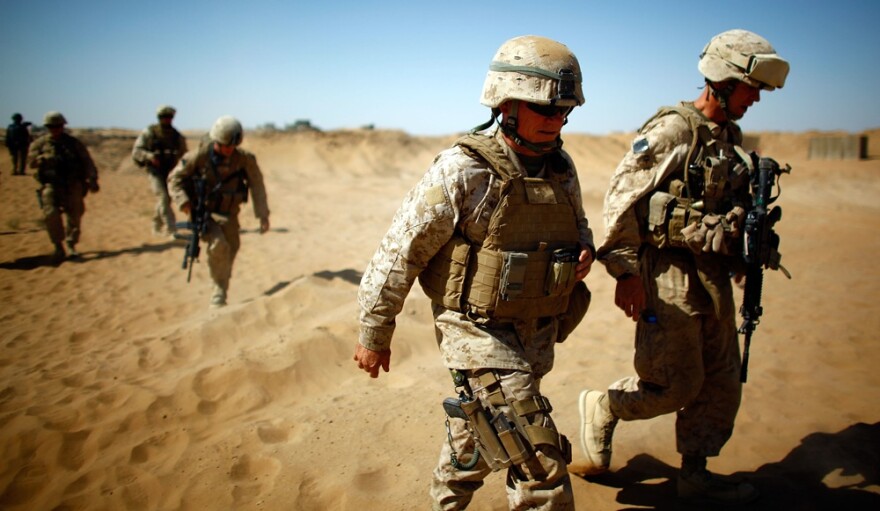The marketplace of Garmsir in Afghanistan's Helmand province is bustling. A long line of shops sells piles of pomegranates, oranges and okra. Consumer goods are trucked in from Pakistan, ranging from children's toys to motorcycle spare parts.
Just a few months ago, American and Taliban forces battled in the streets here.
But just a couple of weeks ago, it was safe enough for a visitor from the United States to stroll about without a helmet or body armor.
Sen. John Kerry of Massachusetts shook hands and chatted with vendors at the stalls, like he was campaigning back in Boston's Faneuil Hall Marketplace.

What brought about this change? About 4,000 infantry Marines. They swept in by helicopter in early July, fanning out across Helmand province to patrol for Taliban fighters. They have made some progress, bringing peace to areas that were once under the grip of Taliban control.
The Marines built heavily fortified outposts, like the one that squats just outside the Garmsir marketplace.
Lt. Col. Christian Cabaniss is the commander of the Marine's 2nd Battalion, 8th Regiment — known as "America's Battalion."
His Marines are responsible for this area, called the "snake's head" — so named because on the map, the green cultivated areas create what appear to be a bulbous head, attached to a long thin body that stretches south along the lush Helmand River valley.
"The northern half of the snake's head is transitioning from 'hold to build,' and that's what we're trying to continue farther south," Cabaniss says.
"Hold to build" is counterinsurgency talk for helping the Afghan government bring back a sense of normal life, like the marketplace.
But there is more work to do.
"Of the top 20 districts that we rate right now as the most dangerous, nine of those remain in Helmand," says Maj. Gen. Michael Flynn, the military's top U.S. intelligence officer in Afghanistan.
On a recent mission from Garmsir, the Marines pushed south into the snake's neck — just six miles south — where they found roadside bombs, or IEDs.

When Marines first came here back in July, they were involved in running gun battles just outside the gate at this patrol base. Now there's another problem, says Sgt. Richard Lacey.
"The IEDs are there, it's not just all them talking. You're not going to see them until you get on them, unless you know what to look for. Since we've been here, we've kind of learned what to look for, where to stay away," Lacey says.
As the Marines continue to move south, they are fighting to set up more patrol bases. Once they do, they make the first tentative efforts to reach out to the local population.
"This is a very isolated area. You don't just come in from the outside and just start talking to people in the community," says Cabaniss. "The more and more they're comfortable and they feel we're going to stay and the government is going to deliver, the more likely they are to tell us things. And when they start telling us, the Taliban has no sea to swim in. They're going to have to leave."
That's the theory, anyway. Lacey knows it doesn't happen overnight. There is progress, but it is slow, he says.
"I think from the time we got here until now has actually kind of improved, from them trusting us and telling us where stuff is, and we'll go out and blow it up," Lacey says.
The Marines quiz farmers and village elders for any information on the insurgents. They promise local projects, schools, roads and bridges.
But it is a tough sell here, and even tougher as the Marines move a few more miles down the snake's body to another marketplace in the town of Lakhari.
Two months ago, the Marines pushed the Taliban out of this marketplace, and the American troops set up an outpost here.
The Marines say that Afghan families are finally starting to move back into the area.
That is welcome news to Brig Gen. Larry Nicholson, the Marine brigade commander who on this day is visiting Lakhari. He asks his Marines about road projects that could help build relationships with locals.
But a major challenge to building local relationships is the lack of Afghan forces. There are only 800 Afghan soldiers in Helmand province, compared to 4,000 Marines. And Nicholson admits that many Afghan police are corrupt and incompetent.
"We are vetting our police. And my assessment ... is that probably 3 to 4 out of every 10 we have probably need to really go home," Nicholson says.
The Afghan government has some presence in the area, but Nicholson says it is nowhere to be seen in these rural areas. Nicholson and other officers know that they have a tenuous hold on Helmand.
Nicholson says he needs more Marines here to take the fight to the Taliban.
"Absolutely. Again, there are areas, frankly, that with more Marines, there are more areas we could get to and do the kind of things we've done in Helmand, there's no question," he says.
A tough area confronting the Marines is Marja, in Helmand, just west of the snake's head. It is a sprawling district of markets and towns with about 200,000 residents.
It is also a center for drug traffickers and the Taliban. If more American troops are sent to Afghanistan, this is where they might end up.
Back in May, U.S. forces raided the area, seizing tons of opium and bomb-making equipment. There are no American troops in Marja now, nor are there Afghan army or police.
But Marja isn't the only problem for the Americans in Helmand province.
At dusk, on a patrol, the Marines bring a State Department adviser named Carter Malkasian to meet a local Afghan leader. The Afghan is named Mullah Aminullah — the Marine's call him "Joe Pesci." Like the characters the actor Pesci plays, the mullah is short and strident — and the Marines are wary of him.
The mullah and the U.S. adviser sit cross-legged in a plowed cornfield, and the mullah lists his grievances. The mullah tells the American that his people fear the Taliban and also fear the Marines.
"Please don't be scared of the Marines," Malkasian tells the mullah. "They want to protect people. Sometimes they have to stop and check people. But they're not going to do anyone any harm. They're not going to hurt you. They're not going to put you in prison. They're just trying to check everyone, to make sure that no one is doing anything dangerous."
But the mullah is more afraid that the Taliban will see him with the Americans. Speaking through a translator, he tells the Americans that he is scared to be speaking with them. "Because during the night, maybe the Taliban will come and kill us." It has happened in other villages many times, he adds.
A few hundred feet from where the meeting is taking place, the Marines find two roadside bombs and detonate them. One of them is on a road next to the mullah's mud house, but he tells the Marines he has no idea who planted the bombs.
And with that, he stood up and said it was time for prayers — and stumbled across the field toward his mosque.
After four months, the work has only begun for the Marines in Helmand province.
Copyright 2022 NPR. To see more, visit https://www.npr.org. 9(MDAzMjM2NDYzMDEyMzc1Njk5NjAxNzY3OQ001))











